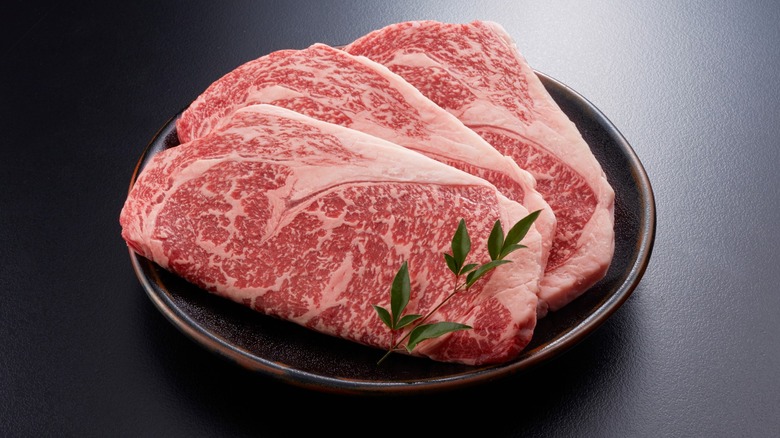Why Knowing The Different Breeds Of Beef Makes All The Difference
If you've ever had Wagyu beef, then you already understand why the breed of cattle matters. Wagyu and true Japanese Kobe are highly prized for the fat marbling throughout the meat, which gives it a buttery, melt-in-your-mouth texture. It's definitely a different experience and maybe the best example of why knowing the breed matters when sourcing your beef: It's going to affect flavor, texture, marbling, and price.
Jon Urbana, founder of KOW Steaks, told us that there are many factors to consider when analyzing beef breed. He said, "Genetics play a major role in flavor, marbling, and texture. But it doesn't stop there — factors like regionality, water quality, feed, and time on feed all influence the final product." It can be hard to know all of that about every cut of beef you buy, but there are places like KOW that create programs to ensure the best quality beef based on all of these factors. The end result goes well beyond what you might think at first.
Sticking with Wagyu, there's more to consider than just the claim that it has more marbling. This breed has a higher monounsaturated-to-saturated fat ratio than any other kind of beef. It also contains 30% more conjugated linoleic acid — a type of fat that may help with reducing weight and cholesterol as well as potentially helping to prevent cancer. On the whole, wagyu is healthier than other kinds of beef by many metrics.
How beef breeds vary
Before Wagyu beef became popular, Angus beef was often considered among the most premium breeds available. Angus cattle, which originate in Scotland, were bred for rich marbling throughout their muscle tissue. These cows have shorter, finer muscle fibers than some other breeds, which gives the meat a softer, more enjoyable texture that is less tough compared to many other breeds, even on the leaner cuts.
Grass-fed Hereford beef may be more tender and juicy, while Holsteins, bred for milk, may have a creamier texture. Rubia Gallega cows are slaughtered much older than most, and their meat develops a more intense flavor. Simmental-Charolais is firm but mild. Understanding what kind of beef you're dealing with doesn't just affect the flavor and texture either.
You also need to factor in how it will be prepared. The marbling in Wagyu beef means it may cook and render faster than other breeds. There's a risk of flare-ups and burning over an open flame too. Angus, on the other hand, cooks better over a more moderate heat for a longer time. Additional factors, such as whether the beef is grass-fed or grain-fed, whether it was raised with hormones or antibiotics, and whether it's free-range, organic, or local, can all affect the flavor, texture, and how you prepare it. It can be a lot to take in, but if you're serious about your beef, it's worth doing the research.

